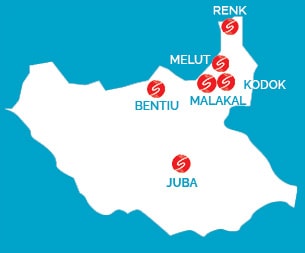Since its independence in 2011, South Sudan has suffered crisis after crisis, whether political, economic or health-related. The violent internal conflict since 2013 has caused millions of people to move. Some are crammed into camps, others flee to neighbouring countries. Ethnic minorities such as the Shilluk are not spared. Some communities have moved 3 or 4 times, leaving everything behind. The 7,500 people settled in Aburoc have enough drinking water, until the fast approaching dry season.
Some are crammed into camps, improvised, overcrowded, unhealthy. Others flee to neighbouring countries: Ethiopia, Uganda, the Democratic Republic of the Congo or Sudan.
Ethnic minorities such as the Shilluk are not immune to civil war and increased pressure from the government. Some communities have moved 3 or 4 times, leaving everything behind.
South Sudan
Context and action- 12.44 million inhabitants
- 191th out of 191 countries on the Human Development Index
- 388.560 people helped
For the past 10 years, SOLIDARITÉS INTERNATIONAL has been supplying drinking water to these populations living in the north of the country, in the city of Malakal and its IDP camp, or in the neighbouring city of Wau Shilluk.
All this time, SOLIDARITÉS INTERNATIONAL has been following these people, supporting them with life-saving water, sanitation and hygiene.
Mainul Islam, SOLIDARITÉS INTERNATIONAL Head of South Sudan Mission
The village of Aburoc, one of the final stages before crossing the Sudanese border, welcomed up to 30,000 people at the peak of the crisis. The people had to share their already limited resources with these newcomers.
The people who came here are like our guests. It is our duty to greet them and share. If the same thing had happened to me, I would have wanted to be welcomed
Nyajure Tipo Deng, from the Aburoc host community
Difficult to access and located on the edge of a swamp, in limited hygiene conditions, Aburoc has experienced a cholera outbreak, affecting nearly 40 people every week. SOLIDARITÉS INTERNATIONAL quickly launched an emergency response in the area, thanks to funding from the European Union.
Following these populations as they moved to Aburoc, our teams immediately helped eliminate cholera in the area.
Today, they continue to provide drinking water to the approximately 7,500 people still present, thanks to the support of donors and the Centre de Crise et de Soutien of the French Ministry of Foreign Affairs.
Such proximity between SOLIDARITÉS INTERNATIONAL, the French Embassy and the Centre de Crise was essential to respond to this problem that could not be left in limbo.
Patrick Buzaud, First Consul, French Embassy in Juba
By treating the surface water pumped from the swamp, SOLIDARITÉS INTERNATIONAL teams are able to supply 10 litres of water per person every day. When IDPs go to the water point, they are also sensitized to good hygiene practices.
Can you hear the sound of the generator? That’s the water being pumped from the swamp. One day it will dry up and we will have to move once again.
Mary Bol, Aburoc IDP
The people of Aburoc now have enough water to meet their vital needs. But the dry season is fast approaching and in the coming months, water will run out. IDPs in Aburoc will certainly have to move once again in search of precious drinking water.
A miracle cannot happen. When there is no water in the environment, there’s nothing we can treat.
Mathieu Guilloteau, SOLIDARITÉS INTERNATIONAL Aburoc Programme Manager
In the villages still populated or on the road with civilians fleeing violence, SOLIDARITÉS INTERNATIONAL teams are determined to work with the most vulnerable people in South Sudan.
These actions were made possible by the European Union, the Centre de Crise et de Soutien, and individual donors’ generosity.

